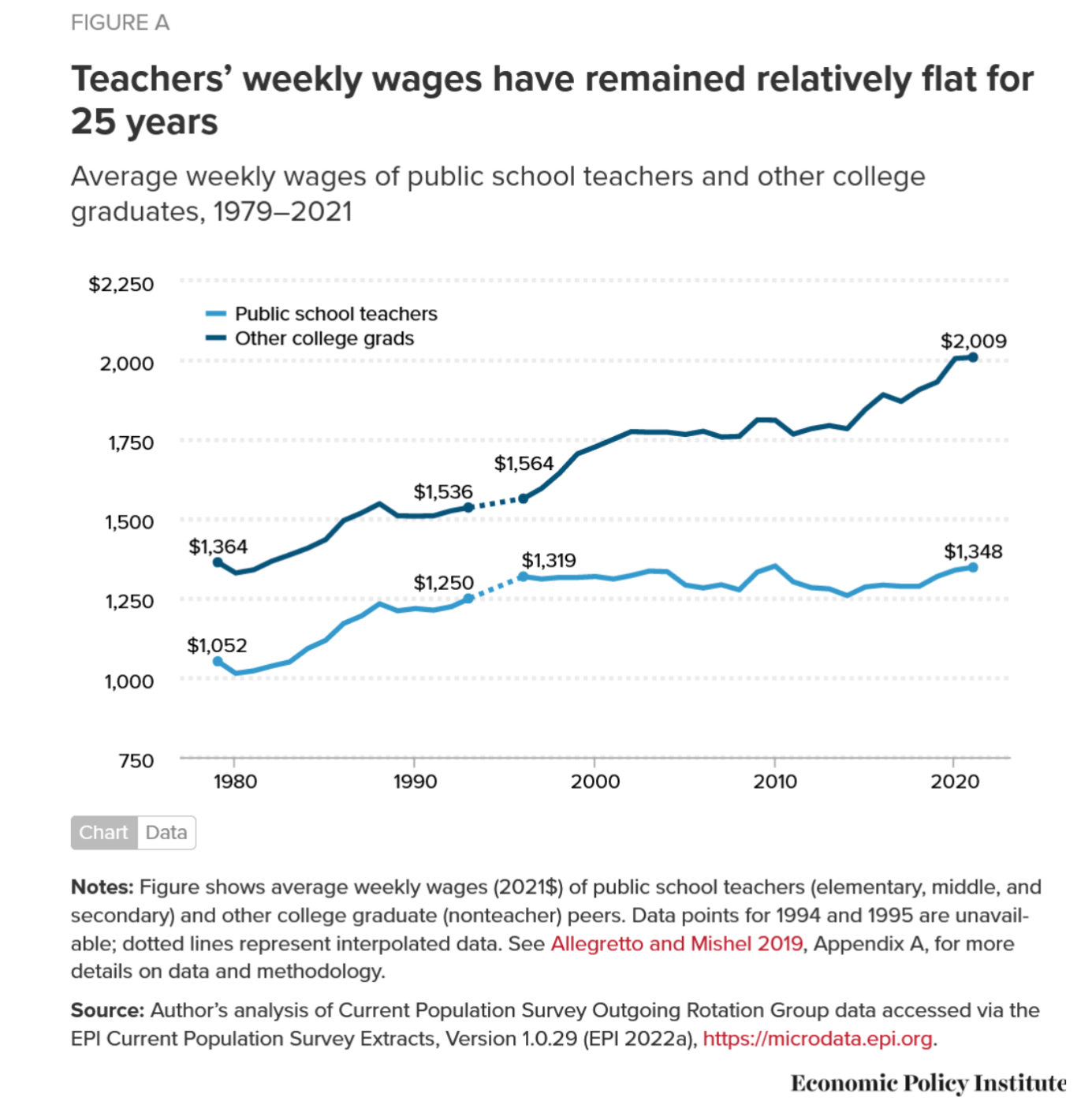The Daily Escape:

Stormy view from House Mountain, Sedona, AZ – August 2022 photo by Ed Mitchell
Tens of thousands of teacher openings are unfilled as students head back to American classrooms. That’s prompting states and school districts to try everything they can to address the teacher shortage.
Except increase their pay. The Economic Policy Institute (EPI) has tracked teacher compensation for 18 years. Here’s the headline:
“…teachers are paid less (in weekly wages and total compensation) than their nonteacher college-educated counterparts, and the situation has worsened considerably over time.”
EPI tracks what they call the relative teacher wage penalty, the relative wages and total compensation of teachers compared to other college graduates. Here are the EPI’s findings:
- Inflation-adjusted average weekly wages of teachers have been relatively flat since 1996. The average weekly wages of public school teachers (adjusted for inflation) increased just $29 from 1996 to 2021, while inflation-adjusted weekly wages of other college graduates rose from $1,564 to $2,009 —a $445 increase.
- The relative teacher wage penalty reached a record high in 2021. It was 23.5% in 2021, up from 6.1% in 1996. The penalty was worse for men than for women. The penalty for men rose from 18.6% to 35.2%.
- The great portfolio of teachers’ benefits used to be a selling point, but it hasn’t been enough to offset the growing wage penalty. The teacher total compensation penalty was 14.2% in 2021 (a 23.5% wage penalty offset by a 9.3% benefits advantage).
- The relative teacher wage penalty exceeds 20% in 28 states. Teacher weekly wage penalties estimated for each state range from 3.4% in Rhode Island to 35.9% in Colorado. In 28 states, teachers are paid less than 80 cents on the dollar earned by similar college-educated workers.
The EPI has a chart showing the relative erosion of teacher wages vs. other college graduates since 1980:

The EPI focuses on “weekly wages” to avoid the comparisons of length of the work year (i.e., the “summers off” issue for teachers).
Add to this the general decline in working conditions for teachers, and many who are eligible for retirement are leaving. Republicans in particular are politicizing education. Some are pushing the idea of “parental rights.” That is happening in Florida, Texas and in other states. It’s clear that in some school districts parents want the right to censor what’s being taught. Some Conservatives are pushing for a camera in every classroom across America. Tucker Carlson called for cameras in classrooms to “oversee the people teaching your children, forming their minds.”
This comes under the guise of “transparency in the classroom”, parents keeping an eye on teachers, so they won’t teach the dreaded Critical Race Theory (or groom kids to become trans, or gay). Teachers naturally bristle at the idea of video auditing.
Forcing teacher compliance with imposed politicized curricula won’t make these jobs any more desirable.
Some states are relaxing licensing requirements to make it easier for people to fill some of those unfilled jobs. Florida, which has about 8,000 open teaching positions, is allowing military veterans without a bachelor’s degree and no prior teaching experience to apply for a temporary five-year teaching certificate while they finish their bachelor’s degrees.
The biggest issues to solve are better public school funding, which can help end the teacher wage penalty. That requires towns to raise taxes. Second, the politicization of education is changing the amount of parental control in the day-to-day operations in some school districts. That’s making teaching an even lower-status job than it is now.
According to the BLS, there are currently 300,000 fewer teachers nationwide compared to before the pandemic. Part of this is job satisfaction. A survey from the American Federation of Teachers found that 74% of teachers were dissatisfied with their job, up from 41% two years ago.
If teachers and staff are underpaid, under-resourced and are now being second-guessed in the classroom, they’re not going to stay. So replacing them will become an even bigger problem.
Enough of this week’s problems, it’s time for our Saturday Soother! Let’s put Trump’s secrets and Liz Cheney’s political prospects on pause. We’re facing moderate drought conditions here in CT, so lawn mowing has ceased, and our grass is brown and crunchy.
But, it’s time to empty our minds, so that we can begin filling them up again on Monday. Start by grabbing a cold glass of lemonade and a seat in the shade.
Now, watch and listen to Antonin Dvorak’s “4 miniatures”, for 2 Violins and Viola, played here by the Musicians of Lenox Hill at Temple Israel of the City of New York in April 2019:

Teachers also face burn out – doing nearly the same thing year after year. I know many teacher including 2 cousins. It is a hard job facing peoples kids. Better off parents think their monster is a sweet little genius. At NY Life – we had a number of former teachers who left at the 10 year mark or so for better pay.